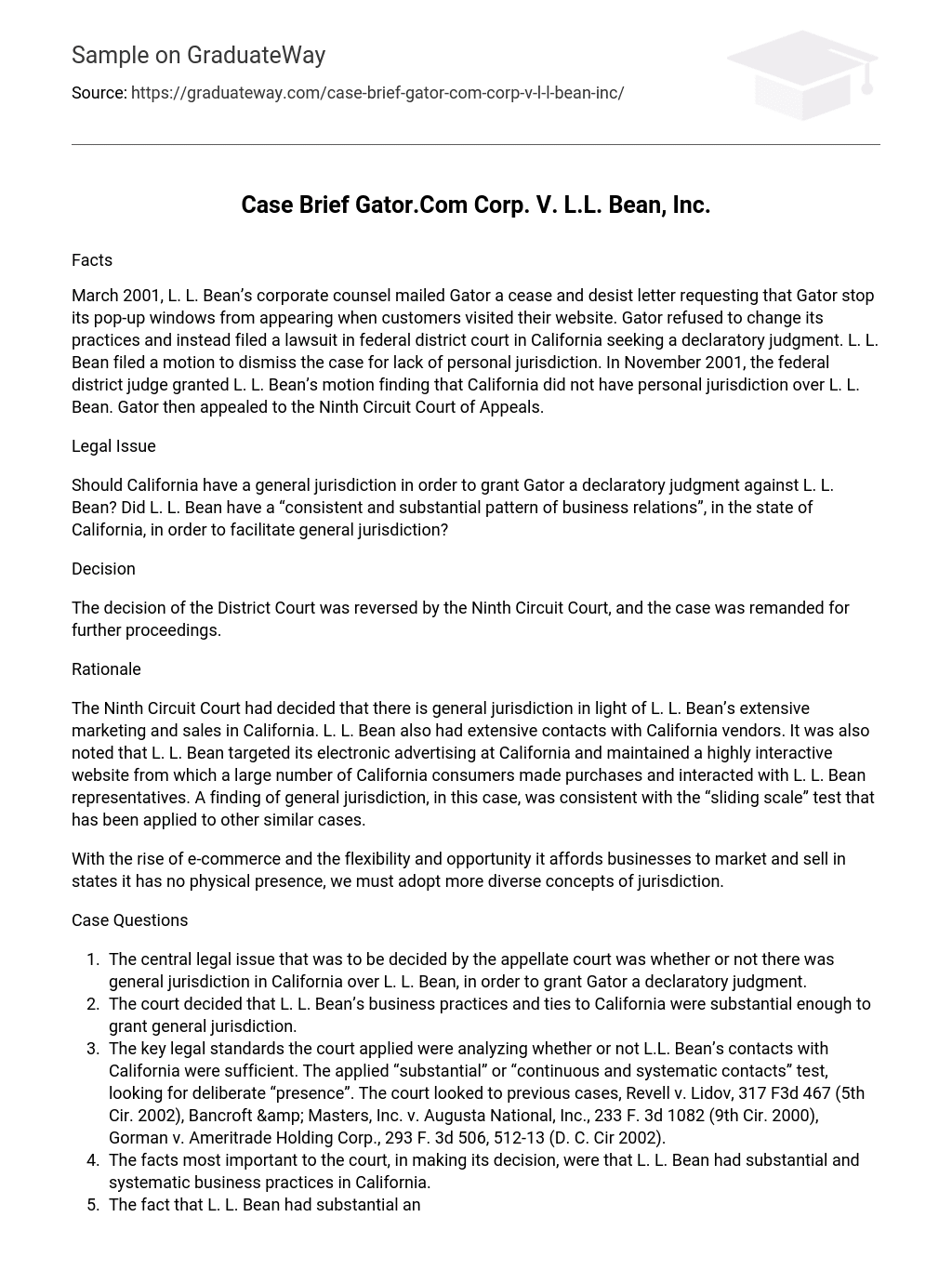Facts
March 2001, L. L. Bean’s corporate counsel mailed Gator a cease and desist letter requesting that Gator stop its pop-up windows from appearing when customers visited their website. Gator refused to change its practices and instead filed a lawsuit in federal district court in California seeking a declaratory judgment. L. L. Bean filed a motion to dismiss the case for lack of personal jurisdiction. In November 2001, the federal district judge granted L. L. Bean’s motion finding that California did not have personal jurisdiction over L. L. Bean. Gator then appealed to the Ninth Circuit Court of Appeals.
Legal Issue
Should California have a general jurisdiction in order to grant Gator a declaratory judgment against L. L. Bean? Did L. L. Bean have a “consistent and substantial pattern of business relations”, in the state of California, in order to facilitate general jurisdiction?
Decision
The decision of the District Court was reversed by the Ninth Circuit Court, and the case was remanded for further proceedings.
Rationale
The Ninth Circuit Court had decided that there is general jurisdiction in light of L. L. Bean’s extensive marketing and sales in California. L. L. Bean also had extensive contacts with California vendors. It was also noted that L. L. Bean targeted its electronic advertising at California and maintained a highly interactive website from which a large number of California consumers made purchases and interacted with L. L. Bean representatives. A finding of general jurisdiction, in this case, was consistent with the “sliding scale” test that has been applied to other similar cases.
With the rise of e-commerce and the flexibility and opportunity it affords businesses to market and sell in states it has no physical presence, we must adopt more diverse concepts of jurisdiction.
Case Questions
- The central legal issue that was to be decided by the appellate court was whether or not there was general jurisdiction in California over L. L. Bean, in order to grant Gator a declaratory judgment.
- The court decided that L. L. Bean’s business practices and ties to California were substantial enough to grant general jurisdiction.
- The key legal standards the court applied were analyzing whether or not L.L. Bean’s contacts with California were sufficient. The applied “substantial” or “continuous and systematic contacts” test, looking for deliberate “presence”. The court looked to previous cases, Revell v. Lidov, 317 F3d 467 (5th Cir. 2002), Bancroft & Masters, Inc. v. Augusta National, Inc., 233 F. 3d 1082 (9th Cir. 2000), Gorman v. Ameritrade Holding Corp., 293 F. 3d 506, 512-13 (D. C. Cir 2002).
- The facts most important to the court, in making its decision, were that L. L. Bean had substantial and systematic business practices in California.
- The fact that L. L. Bean had substantial and systematic business practices in California gave the court the legal support to conclude that general jurisdiction was in accordance with the law.
- I don’t necessarily believe that Gator had the right to have pop-ups show up on L. L. Beans website, however, that is another case. I do agree with the decision regarding jurisdiction, and I agree with the closing statements of the case decision. As our technology advances, and gives businesses the means to operate without physical presence; we must adjust our concepts of jurisdiction to accommodate the changes to uphold the law and protect the rights of everyone.





